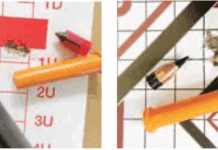Franklin Armory, the Minden, Nevada-based firearms maker, asked its customers to return all 5.56-chambered Antithesis line of short-barreled firearms after a request by the Bureau of Alcohol, Tobacco, Firearms and Explosives (ATF).
On September 19, 2025, Franklin Armory wrote in a statement that ATF had “requested that we voluntarily bring back all 5.56 caliber Antithesis firearms in advance of the agency issuing a new classification. We were surprised by this in light of the U.S. District Court’s ruling in FRAC v. Bondi.”
The statement continued, “Out of an abundance of caution and for the well-being of consumers, dealers, and distributors, we are voluntarily requesting all of our customers to return their 5.56 caliber Antithesis firearms for a full refund.”
“We encourage customers who have taken possession of an Antithesis firearm to contact Franklin Armory Customer service for an RMA (Return Merchandise Authorization) and shipping label,” the statement continued. “This return does not affect Reformation, the .410/45LC Antithesis, or any other firearm made by Franklin Armory.”
Apparently, ATF made the recall request after seeing a Franklin Armory offering for the Antithesis, which read:
Antithesis creates a new class of rifled, short-barrel firearm with no need for NFA registration – Available and transferrable simply as a “firearm” on Form 4473.
Franklin Armory, one of America’s leading manufacturers of innovative firearms and accessories, announced today the launch of Antithesis, a new class of rifled, short-barrel firearm completely unregulated by the National Firearms Act (NFA). Franklin Armory is now shipping 12.5-inch, 12-inch, and 7.5-inch barreled configurations of the new Antithesis™ SBF™ (Short-barreled Franklin) firearm line, each chambered in 5.56 NATO.
Franklin Armory added that they “are also hopeful that continued negotiations with ATF can arrive at a solution that avoids litigation if at all possible.”
The Antithesis firearm has seen nothing but litigation in its short history.
On August 29, 2025, the Bureau of Alcohol, Tobacco, Firearms and Explosives (ATF) issued an open letter that officially rescinded the ATF’s 2019 classification of Franklin Armory’s shorter Reformation and Antithesis firearms as either Short-Barreled Shotguns or Short-Barreled Rifles, respectively, both of which means they would have to be registered under the National Firearms Act.
In 2019, the ATF classified the Reformation as a shotgun under the Gun Control Act (GCA) (18 U.S.C. § 921(a)(6)), or a short-barreled shotgun (SBS) if the barrel was under 18 inches, subjecting it to stringent National Firearms Act (NFA) regulations. Similarly, the Antithesis was classified as a rifle or short-barreled rifle (SBR) under both the GCA and NFA, requiring additional registration and tax stamps.
Franklin Armory’s Reformation and Antithesis firearms challenge traditional firearm classifications. The Reformation, for example, features a straight-grooved barrel that enables it to fire shotshells without conventional rifling, raising questions about whether it qualifies as a shotgun or rifle. Since they have elements of both classifications, they could only be classified as “firearms.”
The Firearms Regulatory Accountability Coalition (FRAC), in partnership with Franklin Armory, challenged the ATF’s rulings in court, arguing that the classifications were inconsistent with the firearms’ designs and legal definitions. The courts vacated the ATF’s classifications, paving the way for a August settlement and the ATF Open Letter.
However, after Franklin Armory began offering the 5.56 Antithesis as an alternative to an NFA rifle, the agency responded with a clarifying statement on X:
“On August 29, 2025, ATF issued an open letter reclassifying Franklin Armory’s Reformation and Antithesis. The open letter implemented a settlement agreement, which classified these weapons as ‘firearms’ under the Gun Control Act but not subject to the controls of the NFA. The open letter only applies to the two models listed in the letter, in the specific configuration that was the subject of the settlement agreement. Other short-barreled firearms are not covered by the settlement agreement, even if they are being branded as ‘Reformation’ or ‘Antithesis’ firearms.”
The agency’s interpretation hinges on the settlement’s protections applying exclusively to the .410/.45 LC configuration that was the subject of the original litigation. The 5.56×45mm version, which fires only single projectiles, would not benefit from the multi-projectile argument that formed the foundation of Franklin Armory’s legal victory.

























